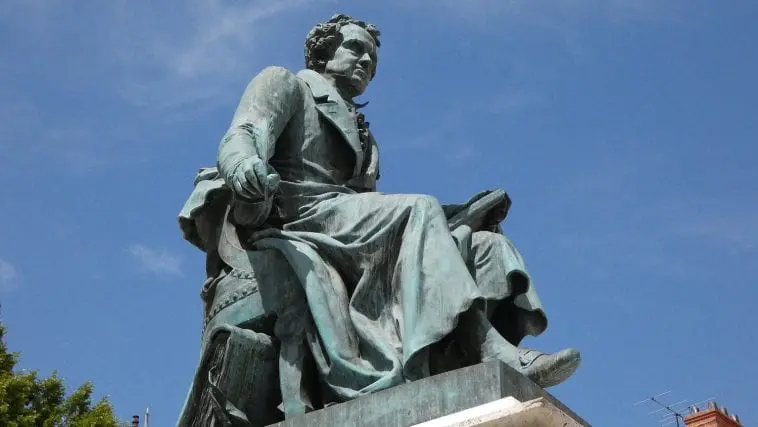[Originally published as André Marie Ampère: A Fascinating Genius and Devout Christian]
As I was working on my elementary science book titled Science in the Industrial Age, I had to research the lives of the men and women who were responsible for those advancements. Many of their stories are fascinating, but today I want to focus on the person from the 1800s whom I found most interesting:
André-Marie [ahn’ dray muh ree’] Ampère [ahm pehr’].
Life Circumstances
Ampère was born into a wealthy French family, which meant that he could have received the best education money could buy. However, his father wanted him to learn on his own. His father never required him to learn anything, but he inspired his son to want to learn. You might say that Ampère was “unschooled.” According to a friend that knew him well, unschooling seemed to work for him. Ampère read all the volumes of the encyclopedia in his father’s library, starting with the first volume and reading in alphabetical order. He also read extensively on natural philosophy (science).
Unfortunately, his life was marred with three serious tragedies. His sister died when he was 17. The next year, his father was executed as a result of the French Revolution. This hit him particularly hard. He had no more interest in learning, and some of his friends thought that he had lost all reason. Then he discovered Jean-Jacques Rousseau’s Letters on the Elements of Botany, and he was pulled from his intellectual lethargy. He later fell in love with and married a woman named Julie, but she died only a few years later.
Christian Experience
Despite these terrible tragedies, Ampère was a devout Christian his entire adult life. When his wife died, he wrote¹ two verses from the Book of Psalms and the following prayer:
O Lord, God of Mercy, unite me in Heaven with those whom you have permitted me to love on earth.
In 1804, Ampère helped to form a group called the Société Chrétienne (Christian Society). Each member was a scholar, and each was given the task of producing a statement about the Christian faith. Ampère was tasked with writing about rational evidence that supports Christianity. While his statement was never officially published, it was included in Claude Alphonse Valson’s biography of Ampère,² which was published in 1886. It includes a very interesting argument:
All modes of proof combine in favor of Christianity. To see the truth, the metaphysician needs only to examine the manner in which the divine religion simultaneously explains the grandeur and the baseness of man, and the idea it gives us of the relations of God with his creatures and of the intentions of Providence.
Why can man mentally embrace all the centuries if he was limited to an existence of a few years? Why, if he was born for the highest destinies, do his penchants bend him, almost everywhere and at all epochs, under the shameful yolk of the most vile passions?
In Ampère’s mind, only divine creation followed by the Fall of Man can explain how man is mortal but can still understand the past and contemplate eternity. In addition, those two events are the only way of explaining why people are both wonderfully rational and morally vile.
When his health began to fail him, he was cared for by one of his friends, Emile Deschamps. His close friend, François Arago, said that his last words were spoken while Deschamps was reading The Imitation of Christ, a devotional book written in the 15th century. According to Arago, Ampère said that he knew the book by heart, and then he died.³
Scientist
These days, of course, Ampère is not known for his Christianity. Instead, he is remembered for his incredible contributions to our understanding of electricity and magnetism. He demonstrated that two wires carrying electricity would attract or repel one another with a magnetic force, depending on the direction the electricity was flowing in each. He developed an equation, called Ampère’s Law, which allows you to calculate the magnetic field produced by electrical current.
He was also the first to explain that all magnetism (even what is found in a permanent magnet) is the result of moving electrical charges. The standard unit of electrical current is named after him, but it is usually abbreviated as “amp.”
While his scientific accomplishments were great, he never lost sight of the reason he was put on earth. When writing to a young scientist, for example, he cautioned the man to keep his perspective:4
Write with only one hand! Hold tightly with the other to God’s raiment like a child clinging to his father’s cloak!
I think everyone who writes would benefit from Ampère’s advice.
References
- The Catholic Encyclopedia, Volume 1, Charles George Herbermann, et. al, Ed., Encyclopedia Press 1913, p. 438
- As quoted in James R. Hofmann, André-Marie Ampère: Enlightenment and Electrodynamics, Cambridge University Press 1995, p. 93
- James R. Hofmann, André-Marie Ampère: Enlightenment and Electrodynamics, Cambridge University Press 1995, p. 366
- James R. Hofmann, André-Marie Ampère: Enlightenment and Electrodynamics, Cambridge University Press 1995, p. 135







